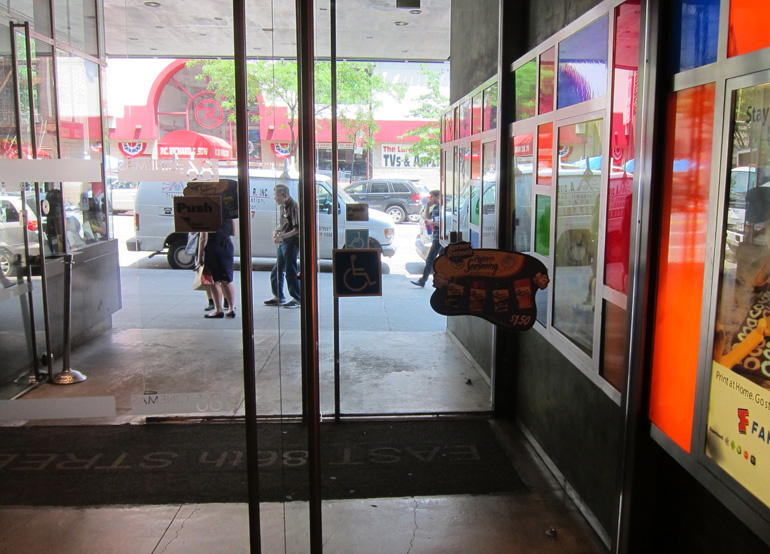Gotham Diary:
No Man
31 May 2013
There’s more to my shaking than the iced coffee that I drank at lunch: what I read while I ate. Part II of George Packer’s The Unwinding comes to a close with a rousing account of semi-organized resistance, in Tampa, Florida, to foreclosing banks. Part III opens with a Senate staffer’s dismay at newly-elected President Obama’s choice of financial ministers. Very little of Packer’s material is new to me, and most of it is quite familiar. But it is as shocking and infuriating as if it were the plot of a novel about rank injustice that I had never read before. That’s because Packer’s perspective is very different from mine. I am a disaffected offspring of the elite, my background is still elite, and that makes it hard for me to see, what Packer makes plain, the egregiousness of the elite’s betrayal of America.
Economists will say that manufacturing jobs drained from the United States to China because of free-market mechanics, and they may be right, but surely someone ought to have stepped in to plug the leak. Far from doing so, men in positions of power built a conduit, a veritable aqueduct to speed up the catastrophe, reaping huge profits and increasing their power. I have a hard time blaming ordinary Americans for having been distracted by the spectacle of television from seeing what was happening, because ordinary Americans have been not only un- but miseducated for generations, their heads stuffed with nonsense that nobody needs to know, their minds left unsharpened by critical training. Children of the elite are taught differently, and divergence between the two systems is now so extreme that what children of the elite learn most of all is that ordinary Americans are, as such, pathetic. The old paternalism was killed off long ago, but nothing has taken its place. Children of the elite can either perpetuate the new order, by working in one way or another for the benefit of what Packer calls “organized money,” or they can lead purely private lives. There is no loyal opposition to the power of organized money in running the country.
There is no loyal opposition. I don’t think that I grasped that until Packer’s book showed it to me. And yet I ought to have known. You can bet that, had I been blogging in 1998, I’d have wailed loud and strong about the repeal of Glass-Steagall; Kathleen and I talked of nothing else. But we could talk only to ourselves. There were a few warning voices, as I recall, but there was no platform from which the repeal’s dereliction of public duty could be effectively denounced. Such a platform was so absent that it couldn’t even be imagined. We were living in the era of organized money already, but we didn’t know it, because we hadn’t seen the power of organized money to disorganize everything else. It took the wreckage of millions of lives to reveal its contours.
Here’s something that seems obvious to me: the opposition of capitalists and socialists in the direction of public policy is a sideshow, obscuring more fruitful and constructive dialogues about persons, goods, and property. Here’s something else (I’ve mentioned it before): the doctrine that corporations are natural persons entitled to the protections of the Fourteenth Amendment, never actually decided by the Supreme Court but attributed to it, needs to be reversed. The natural persons who control corporations ought not to be permitted to hide behind this noxious proposition.
***
Also a little shake-making was Frances Ha, which I saw this morning. Noah Baumbach and Greta Gerwig have created an unforgettable movie about a young woman’s very precarious life in New York City. That’s not what the movie is supposed to be about. Frances Ha is supposed to be about a woman’s coming to terms with having outgrown a college friendship, and, to be sure, that story is told quite well, if rather elliptically. (But then, isn’t it in the nature of friendship to fade when no one is paying attention?) But in the meantime, that young woman is living “on plates of fresh air,” as the old song goes. She ekes out a living that is not quite a living while living, literally, a dream. Frances is not completely in touch with the world around her. There’s an appalling scene at a dinner party at which everything Frances says is inept at best and often inappropriate. (Grace Gummer, playing a person sitting opposite, deserves an Oscar for Best Effortless Radiation of Contempt.) In Frances’s world, however, such behavior does not lead to ejection. On the contrary, Frances comes away from the evening with access to another guest’s great little flat “in the Sixth” (Paris). Not knowing the outcome, I cringed all through the scene. When Frances went home to visit her parents at Christmas (played by Gerwig’s actual parents — very interesting to try to figure out where she gets her looks), I thought that she ought to stay there, even if it was only Sacramento. I was astonished to discover that the “college” where she met her defecting best friend was Vassar. If Greta Gerwig has a shtick, it’s the appearance of being winningly dumber than she really is.

